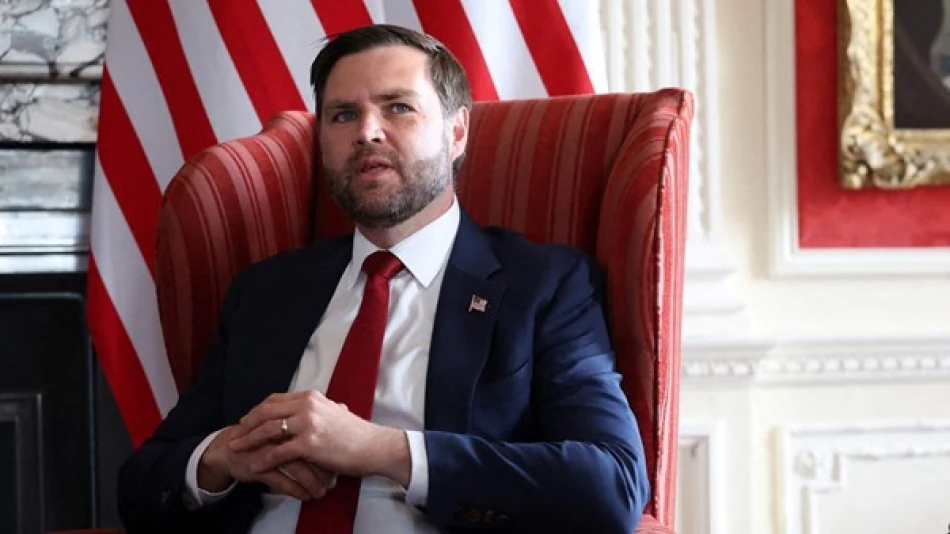
Europe Urged to Boost Ukraine Defense Funding as Tensions Escalate
Trump Administration Declares End to Ukraine Financial Aid as Alaska Summit Looms
Vice President J.D. Vance has reaffirmed the Trump administration's intention to halt U.S. financial support for Ukraine's defense efforts, marking a dramatic shift in American foreign policy that could reshape the three-and-a-half-year conflict. The announcement comes as President Trump prepares for potential peace negotiations with Vladimir Putin in Alaska, signaling the most significant diplomatic pivot since the war began.
America First Policy Takes Center Stage
In a Fox News interview recorded several days ago and broadcast Sunday, Vance made clear that the administration views continued Ukrainian aid as contrary to American interests. "The President and I certainly believe that America has finished funding Ukraine," Vance stated. "We want to reach a peaceful settlement to this war, and we want to stop the killing."
The Vice President framed the decision in populist terms, arguing that "Americans, as I believe, are tired of continuing to send their money, their tax money, to support this conflict specifically." This rhetoric aligns with the administration's broader "America First" agenda, which prioritizes domestic concerns over international commitments.
European Burden-Sharing Becomes Central Issue
Vance outlined a transactional approach to future military support, suggesting Europeans could purchase American weapons directly rather than relying on U.S. taxpayer funding. "If Europeans want to step forward and actually buy weapons from American arms companies, we're okay with that, but we won't fund it ourselves anymore," he explained.
This position reflects long-standing Republican criticism of NATO burden-sharing arrangements and echoes Trump's first-term pressure on European allies to increase defense spending. The approach effectively transforms U.S. military aid from strategic investment to commercial transaction.
Alaska Summit: High-Stakes Diplomacy Without Kyiv
The planned Friday meeting between Trump and Putin in Alaska represents a bold diplomatic gambit that deliberately excludes Ukrainian President Volodymyr Zelensky. This format mirrors historical great power negotiations where smaller nations' interests were decided without their direct participation.
The choice of Alaska as venue carries symbolic weight, representing neutral American territory while avoiding the international scrutiny that would accompany meetings in Washington or Moscow. However, conducting Ukraine negotiations without Ukrainian representation risks undermining the sovereignty principles that have guided Western policy since 2022.
Implications for Global Security Architecture
The administration's approach signals a fundamental reassessment of America's role in European security. Since World War II, U.S. engagement in European conflicts has been justified as preventing larger wars and maintaining favorable balances of power. Trump's willingness to step back suggests confidence that European allies can manage regional security independently—or acceptance that American interests don't require such deep involvement.
For NATO allies, particularly those bordering Russia, the policy shift creates urgent pressure to develop independent defense capabilities. Poland, the Baltic states, and Nordic countries may accelerate military modernization programs while seeking alternative security guarantees.
Economic and Strategic Calculations
The financial dimension cannot be ignored. U.S. aid to Ukraine has exceeded $100 billion since 2022, representing significant fiscal resources during a period of domestic infrastructure needs and budget pressures. The administration's calculus appears to prioritize immediate taxpayer relief over long-term strategic positioning in Eastern Europe.
However, this approach may prove economically shortsighted if reduced American influence allows Russia to consolidate territorial gains and threaten additional European partners. Historical precedent suggests that early diplomatic concessions often prove more expensive than sustained deterrence.
The coming Alaska summit will test whether Trump's negotiating style can achieve sustainable peace or merely temporary ceasefire. Without Ukrainian participation, any agreement risks lacking legitimacy and durability—potentially setting the stage for future conflicts rather than resolving current ones.
Most Viewed News

 Layla Al Mansoori
Layla Al Mansoori






